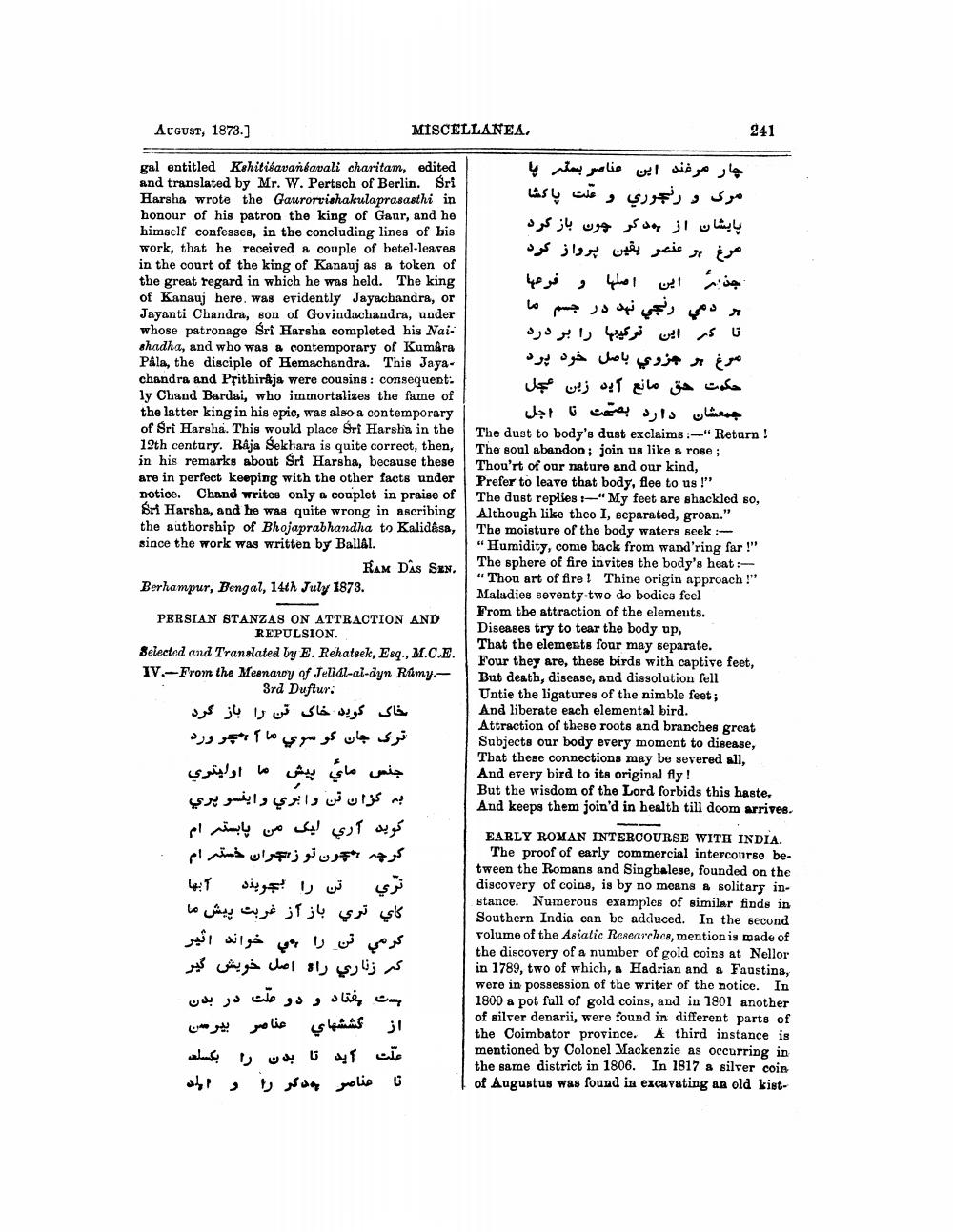________________
AUGUST, 1873.]
MISCELLANEA,
241
gal entitled Kshitibavankavali charitam, edited and translated by Mr. W. Pertsch of Berlin. Sri Harsha wrote the Gaurorvishakulaprasasthi in honour of his patron the king of Gaur, and he himself confesses, in the concluding lines of bis work, that he received a couple of betel-leaves in the court of the king of Kanauj as a token of the great regard in which he was held. The king of Kanauj here. was evidently Jayachandra, or Jayanti Chandra, son of Govindachandra, under whose patronage Sri Harsha completed his Naishadha, and who was a contemporary of Kumara Pala, the disciple of Hemachandra. This Jayachandra and Prithirsja were cousins : consequent. ly Chand Bardai, who immortalizes the fame of the latter king in his epic, was also a contemporary of Sri Harsha. This would place Srf Harsha in the 12th century. Raja Sekhara is quite correct, then, in his remarks about Sri Harsha, because these are in perfect keeping with the other facts under notice. Chand writes only a couplet in praise of Sri Harsha, and he was quite wrong in ascribing the authorship of Bhojaprabhandha to Kalidasa, since the work was written by Ballal.
RAM Das Sxs. Berhampur, Bengal, 14th July 1873.
پا
عناصر بستر چار مرغند این مرک و رنجوري و علت پاکشا
چون باز کرد پایشان از مد کر مرغ هر عنصر بقین پرواز کرد
و فرعها اصلها این جذبه ہر دمي رنجې نهد در جسم ما
ترکیبها را بر درد تا در این
خود پرد مرغ پر جزري باصل حکمت حق مانع ايد زين عجل
دارد بمتعت تا اجل جمعشان
PERSIAN STANZAS ON ATTRACTION AND
REPULSION. Selected and Translated by E. Rehatsek, Esq., M.C.E. IV.- From the Mesnawy of Jelial-al-dyn Ramy.--
3rd Duftur:
The dust to body's dust exclaims :-" Return ! The soul abandon; join us like a rose; Thou'rt of our nature and our kind, Prefer to leave that body, flee to us!" The dust replies -"My feet are shackled so, Although like thee I, separated, groan." The moisture of the body waters seek: "Humidity, come back from wand'ring far!" The sphere of fire invites the body's heat:"Thou art of fire ! Thine origin approach !" Maladies seventy-two do bodies feel From the attraction of the elemeuts. Diseases try to tear the body up, That the elements four may separate. Four they are, these birds with captive feet, But desth, disease, and dissolution fell Untie the ligatures of the nimble feet; And liberate each elemental bird. Attraction of these roots and branches great Subjects our body every moment to disease, That these connections may be severed all, And every bird to its original fly! But the wisdom of the Lord forbids this haste, And keeps them join'd in health till doom arrivee.
تن را باز کرد کوین خاک خاک ترک جان کو سوي ما ) پر درد
ما ارايتري ماي پیش جنس به گزان تن را بري واينسو پري
من پابسته ام گوید آري ايی کر چہ چون تو زجران خسته ام
ابها تن را بجویند تري كاي تري باز از غربت پیش ما
خواند اثير کر مي نن را مي کہ زناري راه اصل خویش گیر پست هفتاد و دو ملت در بدن
بیرمن
عناصر کششهاي از
بكسله
را تا بدن اید علت
ر الحد کود کر را عناصر تا
EARLY ROMAN INTERCOURSE WITH INDIA.
The proof of early commercial intercourse between the Romans and Singhalese, founded on the discovery of coins, is by no means a solitary instance. Numerous examples of similar finds in Southern India can be adduced. In the second volume of the Asiatic Researches, mention is made of the discovery of a number of gold coins at Nellor in 1789, two of which, a Hadrian and a Faustina, were in possession of the writer of the notice. In 1800 a pot full of gold coins, and in 1801 another of silver denarii, were found in different parts of the Coimbator province. A third instance is mentioned by Colonel Mackenzie as occurring in the same district in 1806. In 1817 a silver coin of Augustus was found in excavating an old kist




